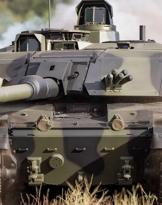"The battlefield of the future will be populated by fewer human beings. Those on the battlefield, however, will have superior physical and mental capabilities: they will have a better perception of the environment and will be stronger, more intelligent and more powerful. alongside the Killers Automated Hunters of various kinds ”.
According to the report, success in the war of the future will be determined by seven factors: augmented reality, automated decision-making, new weapons, computerized aiming, large-scale self-organization, cognitive adversary modeling, ability to react in an extreme environment with little information.
In the report, the troops of the future are listed in no uncertain terms. Autonomous robots of large scale and few humans. The latter, however, to compare with the automated troops must be equipped with the latest technology.
No longer human but Super-Human
"Equipped with advanced exoskeletons, the Super-Humans will manage a series of technologies that will guarantee them easy detection and cognitive improvements."
"The Super-Humans will be scary and unstoppable war machines: they will be armored and equipped with laser weapons. Considering that communication, in the scenario of the future, will be fundamental, the exoskeleton will have to be shielded against every enemy attack (Emp, hacker). An energy shield (we know they already exist) could be a solution even if there are cloud-robots in the study that would have the task of shielding the operator from cyber attacks ".
"The same Super-Human armor must be self-healing, able to camouflage itself, learning from the surrounding environment and guaranteeing an optimal source of power to all the systems implemented."
In the report, four possible energy sources are cited: 1 - mobile nuclear power 2 - wireless power supply 3 - organic renewable energy 4 - ability to tap into enemy infrastructure.
“The Super-Humans will be equipped with 'leeches' (leeches). Drones launched by the operator towards an energy source. Once at their destination, the leeches will transmit the energy to the human exoskeleton ”. It is clear that the first target of the 2050 war will be the energy sources to keep robots and Super-Humans operational on the battlefield.
But in the report, American scientists go further. For the first time, after decades of silence (imposed), the use of genetically modified soldiers is assumed. "The Super-Humans will have to be different even without the equipment we will provide them. This is why the possibility of modifying their DNA must be taken seriously. The Super-Humans will have to have better physical and cognitive abilities than the soldier of the special units ".
It is emphasized in the report "The presence of super soldiers on the battlefield of the 2050 is highly probable, considering that the various components necessary to allow this development exist and are in a phase of rapid evolution".
There has been no lack of criticism of the document. One wonders, in fact, what would happen if an enemy hacker were able to circumvent the system and command the automated troops, perhaps directing them against the creators themselves. A new cognitive process would then be needed, perhaps a hybrid architecture that can guide the decision-making capacity of murderous robots.
The ethical issue, faced several times during the assassination missions with the CIA's drones, is in this case even more extreme. In the battlefield of the future, in fact, robots will do the dirty work, while humans will increasingly become referees for "eliminations" that, in the end, they would not be responsible.
Finally, what would happen if humanity no longer had control over the effects of technological progress?
Franco Iacch












